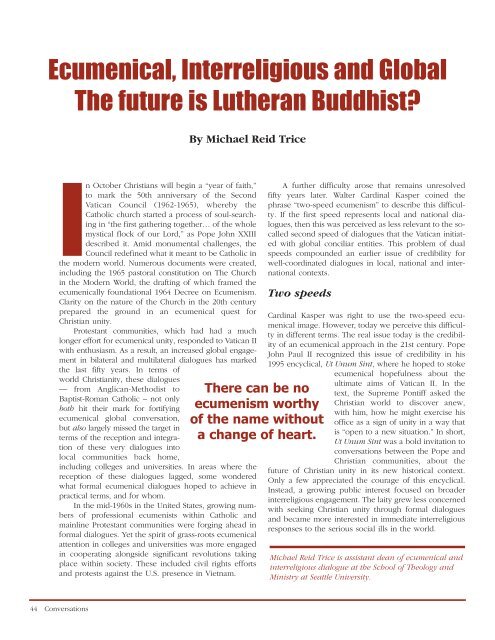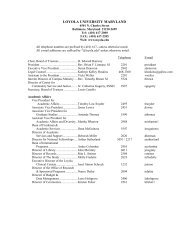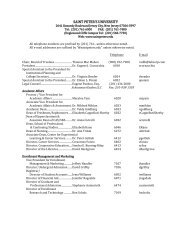to download it today - Association of Jesuit Colleges and Universities
to download it today - Association of Jesuit Colleges and Universities
to download it today - Association of Jesuit Colleges and Universities
Create successful ePaper yourself
Turn your PDF publications into a flip-book with our unique Google optimized e-Paper software.
Ecumenical, Interreligious <strong>and</strong> Global<br />
The future is Lutheran Buddhist?<br />
In Oc<strong>to</strong>ber Christians will begin a “year <strong>of</strong> fa<strong>it</strong>h,”<br />
<strong>to</strong> mark the 50th anniversary <strong>of</strong> the Second<br />
Vatican Council (1962-1965), whereby the<br />
Catholic church started a process <strong>of</strong> soul-searching<br />
in “the first gathering <strong>to</strong>gether… <strong>of</strong> the whole<br />
mystical flock <strong>of</strong> our Lord,” as Pope John XXIII<br />
described <strong>it</strong>. Amid monumental challenges, the<br />
Council redefined what <strong>it</strong> meant <strong>to</strong> be Catholic in<br />
the modern world. Numerous documents were created,<br />
including the 1965 pas<strong>to</strong>ral const<strong>it</strong>ution on The Church<br />
in the Modern World, the drafting <strong>of</strong> which framed the<br />
ecumenically foundational 1964 Decree on Ecumenism.<br />
Clar<strong>it</strong>y on the nature <strong>of</strong> the Church in the 20th century<br />
prepared the ground in an ecumenical quest for<br />
Christian un<strong>it</strong>y.<br />
Protestant commun<strong>it</strong>ies, which had had a much<br />
longer effort for ecumenical un<strong>it</strong>y, responded <strong>to</strong> Vatican II<br />
w<strong>it</strong>h enthusiasm. As a result, an increased global engagement<br />
in bilateral <strong>and</strong> multilateral dialogues has marked<br />
the last fifty years. In terms <strong>of</strong><br />
world Christian<strong>it</strong>y, these dialogues<br />
— from Anglican-Methodist <strong>to</strong><br />
Baptist-Roman Catholic – not only<br />
both h<strong>it</strong> their mark for fortifying<br />
ecumenical global conversation,<br />
but also largely missed the target in<br />
terms <strong>of</strong> the reception <strong>and</strong> integration<br />
<strong>of</strong> these very dialogues in<strong>to</strong><br />
local commun<strong>it</strong>ies back home,<br />
including colleges <strong>and</strong> univers<strong>it</strong>ies. In areas where the<br />
reception <strong>of</strong> these dialogues lagged, some wondered<br />
what formal ecumenical dialogues hoped <strong>to</strong> achieve in<br />
practical terms, <strong>and</strong> for whom.<br />
In the mid-1960s in the Un<strong>it</strong>ed States, growing numbers<br />
<strong>of</strong> pr<strong>of</strong>essional ecumenists w<strong>it</strong>hin Catholic <strong>and</strong><br />
mainline Protestant commun<strong>it</strong>ies were forging ahead in<br />
formal dialogues. Yet the spir<strong>it</strong> <strong>of</strong> grass-roots ecumenical<br />
attention in colleges <strong>and</strong> univers<strong>it</strong>ies was more engaged<br />
in cooperating alongside significant revolutions taking<br />
place w<strong>it</strong>hin society. These included civil rights efforts<br />
<strong>and</strong> protests against the U.S. presence in Vietnam.<br />
44 Conversations<br />
By Michael Reid Trice<br />
A further difficulty arose that remains unresolved<br />
fifty years later. Walter Cardinal Kasper coined the<br />
phrase “two-speed ecumenism” <strong>to</strong> describe this difficulty.<br />
If the first speed represents local <strong>and</strong> national dialogues,<br />
then this was perceived as less relevant <strong>to</strong> the socalled<br />
second speed <strong>of</strong> dialogues that the Vatican in<strong>it</strong>iated<br />
w<strong>it</strong>h global conciliar ent<strong>it</strong>ies. This problem <strong>of</strong> dual<br />
speeds compounded an earlier issue <strong>of</strong> credibil<strong>it</strong>y for<br />
well-coordinated dialogues in local, national <strong>and</strong> international<br />
contexts.<br />
Two speeds<br />
There can be no<br />
ecumenism worthy<br />
<strong>of</strong> the name w<strong>it</strong>hout<br />
a change <strong>of</strong> heart.<br />
Cardinal Kasper was right <strong>to</strong> use the two-speed ecumenical<br />
image. However, <strong>to</strong>day we perceive this difficulty<br />
in different terms. The real issue <strong>to</strong>day is the credibil<strong>it</strong>y<br />
<strong>of</strong> an ecumenical approach in the 21st century. Pope<br />
John Paul II recognized this issue <strong>of</strong> credibil<strong>it</strong>y in his<br />
1995 encyclical, Ut Unum Sint, where he hoped <strong>to</strong> s<strong>to</strong>ke<br />
ecumenical hopefulness about the<br />
ultimate aims <strong>of</strong> Vatican II. In the<br />
text, the Supreme Pontiff asked the<br />
Christian world <strong>to</strong> discover anew,<br />
w<strong>it</strong>h him, how he might exercise his<br />
<strong>of</strong>fice as a sign <strong>of</strong> un<strong>it</strong>y in a way that<br />
is “open <strong>to</strong> a new s<strong>it</strong>uation.” In short,<br />
Ut Unum Sint was a bold inv<strong>it</strong>ation <strong>to</strong><br />
conversations between the Pope <strong>and</strong><br />
Christian commun<strong>it</strong>ies, about the<br />
future <strong>of</strong> Christian un<strong>it</strong>y in <strong>it</strong>s new his<strong>to</strong>rical context.<br />
Only a few appreciated the courage <strong>of</strong> this encyclical.<br />
Instead, a growing public interest focused on broader<br />
interreligious engagement. The la<strong>it</strong>y grew less concerned<br />
w<strong>it</strong>h seeking Christian un<strong>it</strong>y through formal dialogues<br />
<strong>and</strong> became more interested in immediate interreligious<br />
responses <strong>to</strong> the serious social ills in the world.<br />
Michael Reid Trice is assistant dean <strong>of</strong> ecumenical <strong>and</strong><br />
interreligious dialogue at the School <strong>of</strong> Theology <strong>and</strong><br />
Ministry at Seattle Univers<strong>it</strong>y.




